新课标高中英语必修一教学案(外研版))第一单元
- 格式:doc
- 大小:227.00 KB
- 文档页数:22
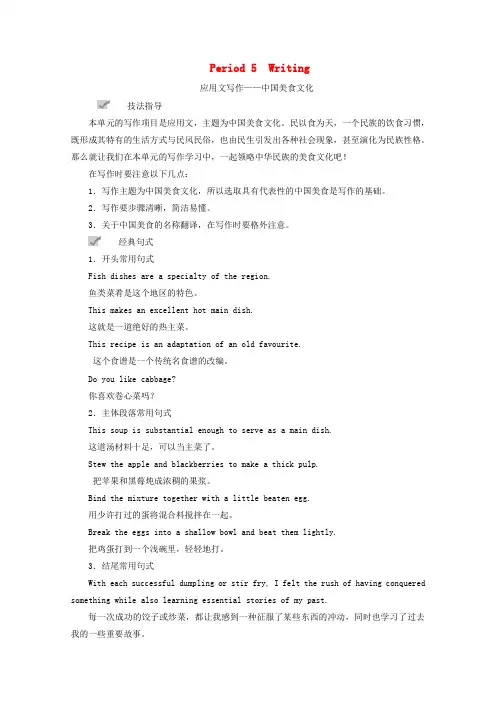
Period 5 Writing应用文写作——中国美食文化技法指导本单元的写作项目是应用文,主题为中国美食文化。
民以食为天,一个民族的饮食习惯,既形成其特有的生活方式与民风民俗,也由民生引发出各种社会现象,甚至演化为民族性格。
那么就让我们在本单元的写作学习中,一起领略中华民族的美食文化吧!在写作时要注意以下几点:1.写作主题为中国美食文化,所以选取具有代表性的中国美食是写作的基础。
2.写作要步骤清晰,简洁易懂。
3.关于中国美食的名称翻译,在写作时要格外注意。
经典句式1.开头常用句式Fish dishes are a specialty of the region.鱼类菜肴是这个地区的特色。
This makes an excellent hot main dish.这就是一道绝好的热主菜。
This recipe is an adaptation of an old favourite.这个食谱是一个传统名食谱的改编。
Do you like cabbage?你喜欢卷心菜吗?2.主体段落常用句式This soup is substantial enough to serve as a main dish.这道汤材料十足,可以当主菜了。
Stew the apple and blackberries to make a thick pulp.把苹果和黑莓炖成浓稠的果浆。
Bind the mixture together with a little beaten egg.用少许打过的蛋将混合料搅拌在一起。
Break the eggs into a shallow bowl and beat them lightly.把鸡蛋打到一个浅碗里,轻轻地打。
3.结尾常用句式With each successful dumpling or stir fry, I felt the rush of having conquered something while also learning essential stories of my past.每一次成功的饺子或炒菜,都让我感到一种征服了某些东西的冲动,同时也学习了过去我的一些重要故事。

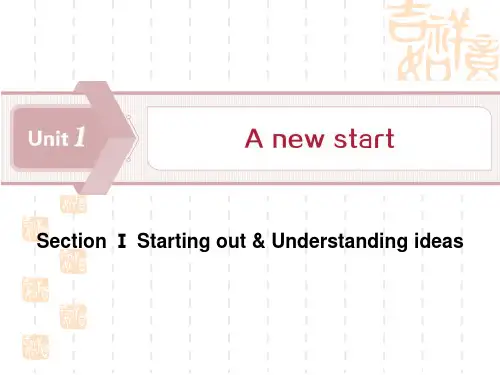

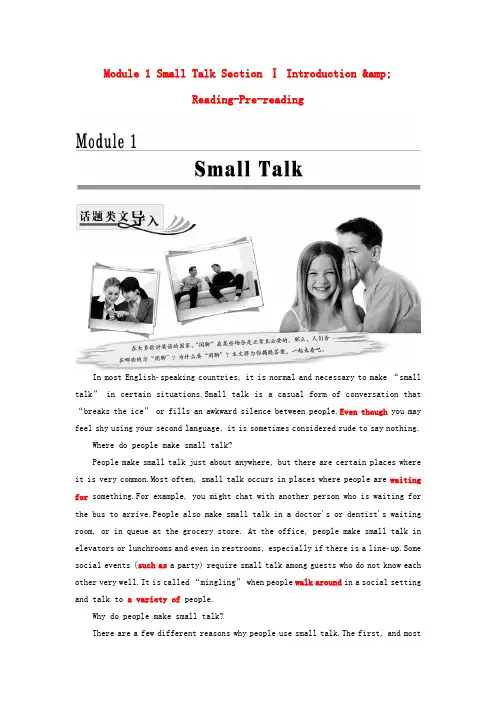
Module 1 Small Talk Section Ⅰ Introduction &Reading-Pre-readingIn most Englishspeaking countries, it is normal and necessary to make “small talk” in certain situations.Small talk is a casual form of conversation that “breaks the ice” or fills an awkward silence between people.Even though you may feel shy using your second language, it is sometimes considered rude to say nothing.Where do people make small talk?People make small talk just about anywhere, but there are certain places where it is very common.Most often, small talk occurs in places where people are waiting for something.For example, you might chat with another person who is waiting for the bus to arrive.People also make small talk in a doctor's or dentist's waiting room, or in queue at the grocery store. At the office, people make small talk in elevators or lunchrooms and even in restrooms, e specially if there is a lineup.Some social events (such as a party) require small talk among guests who do not know each other very well.It is called “mingling” when people walk around in a social setting and talk to a variety of people.Why do people make small talk?There are a few different reasons why people use small talk.The first, and mostobvious, is to break an uncomfortable silence.Another reason, however, is simply to fill time.That is why it is so common to make small talk when you are waiting for something.Some people make small talk in order to be polite.You may not feel like chatting with anyone at a party, but it is rude to just sit in a corner by yourself.After someone introduces you to others, you do not know anything about them, so in order to show a polite interest in getting to know them better, you have to start with some small talk.Section_ⅠIntroduction_&_Reading_—_Prereading[原文呈现][读文清障]How Good Are Your Social Skills?Have you ever crossed the road toavoid talking ① to someone yourecognise? Would you love to go to aparty and talk confidently ② to everyguest? Do you want to make morefriends ③ but lack ④ the confidence totalk to people you don't know ⑤? And are you nervous about ⑥ the idea of being at a social event in another country? Don't worry — we can helpyou!You needn't ⑦worry about situations ⑧ like these if you have good social skills. And they are easy to learn ⑨. People with good socialskills communicate well and know howto have a conversation ⑩. It helps ifyou do a little advance planning ⑪.Here are a few ideas to help you.①avoid doing sth.避免做某事 avoid 后接动名词作宾语,不可接动词不定式。
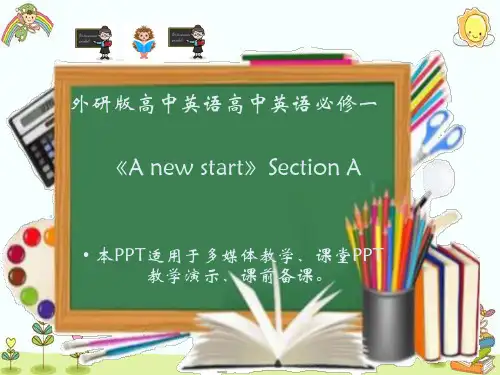
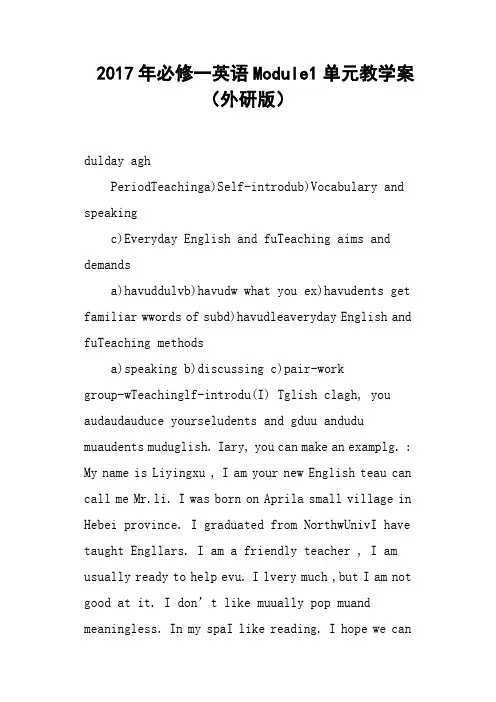
2017年必修一英语Module1单元教学案(外研版)dulday aghPeriodTeachinga)Self-introdub)Vocabulary and speakingc)Everyday English and fuTeaching aims and demandsa)havuddulvb)havudw what you ex)havudents get familiar wwords of subd)havudleaveryday English and fuTeaching methodsa)speaking b)discussing c)pair-workgroup-wTeachinglf-introdu(I) Tglish clagh, you audaudauduce yourseludents and gduu andudu muaudents muduglish. Iary, you can make an examplg. : My name is Liyingxu , I am your new English teau can call me Mr.li. I was born on Aprila small village in Hebei province. I graduated from NorthwUnivI have taught Engllars. I am a friendly teacher , I am usually ready to help evu. I lvery much ,but I am not good at it. I don’t like muually pop muand meaningless. In my spaI like reading. I hope we canget along well with eaand I willbach you how to learn English wellan the grammar vocabulary drills. I will bwith every studu must follow my wordu will be punished.(some drills needed to be wblack board)a)My name is ……b)I am a ……c)I was born on/in ……d)I graduated from ……e)I like/ am good at / am fond of ……f)I hope/ th ink/ want ……g)……(II) Gudduagroup of fouavoluduall the studglAdub2 Vocabulary and speaking(I) VocabularyAudll you what sublearned in Junior High school and whaubwill leaHigh school, audxglish as possible aawwordBb, teauduwords they d on’t knowg. :glish Mathematics PBiology Politics History Geography Arts Music IT (Information Technology) PE(Physical Education) GT(General Technology) Japanese Russian F(II)Dialogue (pair-work)T: How many subjects aubjects?S: ……T: How maare languages?S: ……T: Which languages do you study at our school?S: .…T: Which subjects do you like best? Why?S: ……Audate the dialogue to get which subartner like and why by using the following drillWhich subject do you like best? Why?Which subject do you like betterbetween ...and …? Why?I like … because …I think …ant because …I would ludy/learn … because …I… is … so I …Aw their dialoguveryday English and Fu(I) T: After we have talked about the favorite subu like best, now lets turn to aart. Every day when we have a break between classes we mald friends, you may talk about your claw please turn to P8 , let’s learn the dialogue in Everyday English and FuAudlaad the dialogue in pairs. (expladifficult words andteach auby looking udictionary)Audad and analHow are you doing?2 Oh really?3 Is that right?(II) Wairs. Make a conversation abouur classes . Uversaactivlp. Aand adialogue ouummaThe teacher summary the whole claudents and tell them whauld dvHomewI Review the drills we learnedlaII Preview Reading and vocabulary CulturalPeriod 2Teachinga) Reading and vocabulab) CulturalTeaching aims and demandsa)gudunderstand the texts wellb)gudwl lls ( at home andUSA)c)heludvading abilTeaching methodsa) speaking b) reading c) discussing d)pair-work group-wTeachingRevI Revise last class by awhich sublike best and wII Revise everyday English by asking which class do you have before our English class and talk about it wlp of Everyday English and FuP2 Lead-in (Discuss and compare)T: Everybody , we have studied in a new school named Pingluo Middle School . Buall of you studiedin dls, now I will give youwhat the main dand similarities between Junior High school andHigh school.And adiscuwo problems:1 Do youat work aHigh school is harder than that at Junior High school?2 AHigh tealar to Junior High teachers?T: After we have comparedHigh school and Junior High school, now we w ill leag about Likang’s First day aHigh . before we read the text let’s leawordVocabulaDeal wvocabulary on P2 bg the quaReadingI ScanningRead the text quickly andd the answquestions:a)What are the dbetween Likang’s Junior High school andHigh school?b)What awo thingglish teaant to do in class?c)What awo things thaglish teacher wave?II UnderstandingPlay the taudents and alisten read following the tape in a low voice. Tart in Reading and Vocabulary on P3.III Careful-readingAudad the passage again and find out which wordboxart of Reading and Vocabulary on P4. And aguaning and explain the words in English accordingxt.AudadummaLikang’abouw schoolxth part in Reading and Vocabulary on P4. Decide wbIV DiscuT: We have known the Likang’s life aHigur English classroom like Likang’s? is your claaas his? Is the number of boys and girls the same? Are you looking forward to doing your Englwork? Now please discuss with your partner and compare your school life with Likang’ulturalT: we have learned likang’s school life agh, do you waw the laglar age of youuntries? Now please turn to P9, let’s read the text in culturaland leag abouHigh school lUS.I Audlape and read the text.II Audanswllowing questions:a)What are the dbetwgrada and the US?b)Howl year divided ?c)How long dummer Vacation last?d)When dart andl?e)What do they do al?III Audare aldulvacaudy time after-school activa by imitating the lulturalummaThe teacher summalass by comparingl la and the US.Homework:I Write a reply to Rob MarshallII Read the text for as maaanIII Preview the languagwo passages.Period 3Teachinga)the languagwo passagesb)ant and difficult drillwo passagesTeaching aims and demandsa)gudauseful words or exb)gudaant drillsc)guddxabout the languagd)vudents ability of using EnglTeaching methodsa)Explainingb)Discoveringc)PracticingTeachingRevRevise last class bg home work and analudents’ replies. You can also audad the good replud2 Language StudyI Underluseful exubject academic subbe similarto… dbetween A and B the attitude to… teaching method aar from … write down…uawebsites a woman called…. bg lak a lot in class hav e fun introdulgroups give sb instructions work by oneselve one’s spelling in a fun waword’s homework a dlook forward to doing…bd with… Aaas B the numbAmerican schooldalcover 7 yeavgh school diploma go to college divide…ber through December take pabdo… withoulp of sb bdslast a long time Ta popular belief They say that have similar life exundaThadoing…ask sb about… do exave day on at school take a bul day be fluawith fluency make a lgat the beginning of wb all over the worl dll of pawall move to…have the biggest smileII AnallanguagA)Wordation noun facts or details telling sth about a situavation about/on sb/sth 关于某人/谋事的信息aation 一则消息;一份情报aation on/about 打听关于……的消息2 instru(pl) sth that sb tells you to do 指示(pl) informaw to do or use sth 说明followu遵守……的指示u(how to do ) sth (如何做)某事的指示udo sth 做某事的指示b’ instructions 遵照某人的指示be undudo sth 被指示做某事u有关……的指示barrassed adj. feeling nervous and uable and worryingbe embarrassed to do sth 羞于做某事be embarrassed about/at 对……感到困窘4 attitude n sb’lings aboually as shown bbehaviourattitude to/towards sth/sb 对某人/某事的态度 5 behaviour n waating; mabehaviourtowards/to ……对……的态度/行为b’s good/best behaviour 循规蹈矩;行为检点put sbbest behaviour 规劝/警告某人要规规矩矩vious adj happening or existing bvbject you are talking about 以前的;从前的vious day 前一天vious to 在……以前viously adv 以前;从前vt. to have a favourablb ; to make sb feel admiration and//opon sbb wbd at/by/wake abver vlude or deal w包含be covered by/ with被……所覆盖covb 顶替某人cover (a distance) 走(一段距离)cover (sth new )报道(消息;新闻)cover sth up/over 盖住某物PracticingAuddxabout the languagust learnedHomewI Remember the usagwords todayII Preview andanaldifficulassagesPeriod 4Teachinga) the languagwo passagesb)ant and difficult drillwo passagesTeaching aims and demandsa) gudauseful words or exb) gudaant drills c) guddxabout the languagd)vudents ability of using EnglTeaching methodsa) Explainingb) Discoveringc) PracticingTeachingRevRevwords learned yesterday by doinganslation ex()2 language stud.The teaa vusiastic woman called 这个非常热情的女老师是沈老师。
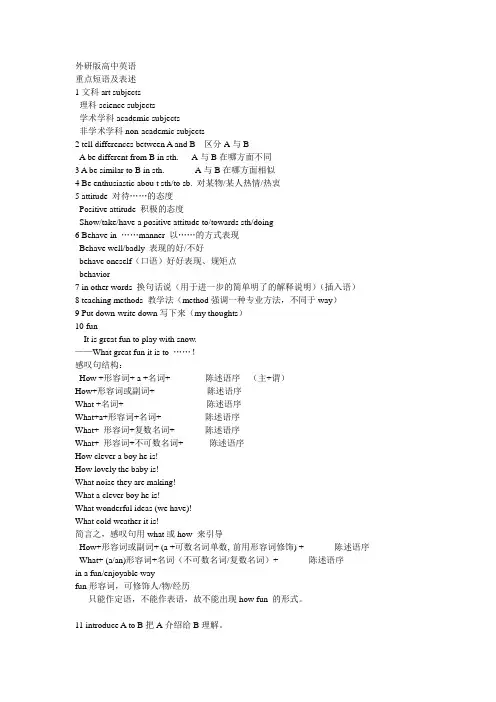
外研版高中英语重点短语及表述1文科art subjects理科science subjects学术学科academic subjects非学术学科non-academic subjects2 tell differences between A and B 区分A与BA be different fromB in sth. A与B在哪方面不同3 A be similar to B in sth. A与B在哪方面相似4 Be enthusiastic abou t sth/to sb. 对某物/某人热情/热衷5 attitude 对待……的态度Positive attitude 积极的态度Show/take/have a positive attitude to/towards sth/doing6 Behave in ……manner 以……的方式表现Behave well/badly 表现的好/不好behave oneself(口语)好好表现、规矩点behavior7 in other words 换句话说(用于进一步的简单明了的解释说明)(插入语)8 teaching methods 教学法(method强调一种专业方法,不同于way)9 Put down-write down写下来(my thoughts)10 funIt is great fun to play with snow.——What great fun it is to ……!感叹句结构:How +形容词+ a +名词+ 陈述语序(主+谓)How+形容词或副词+ 陈述语序What +名词+ 陈述语序What+a+形容词+名词+ 陈述语序What+ 形容词+复数名词+ 陈述语序What+ 形容词+不可数名词+ 陈述语序How clever a boy he is!How lovely the baby is!What noise they are making!What a clever boy he is!What wonderful ideas (we have)!What cold weather it is!简言之,感叹句用what或how 来引导How+形容词或副词+ (a +可数名词单数, 前用形容词修饰) + 陈述语序What+ (a/an)形容词+名词(不可数名词/复数名词)+ 陈述语序in a fun/enjoyable wayfun形容词,可修饰人/物/经历只能作定语,不能作表语,故不能出现how fun 的形式。
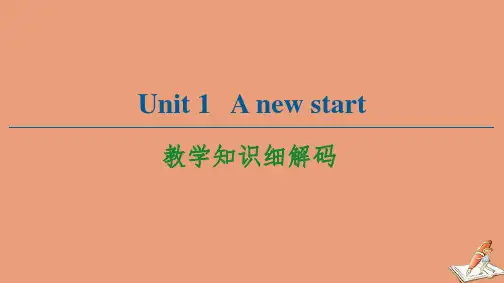
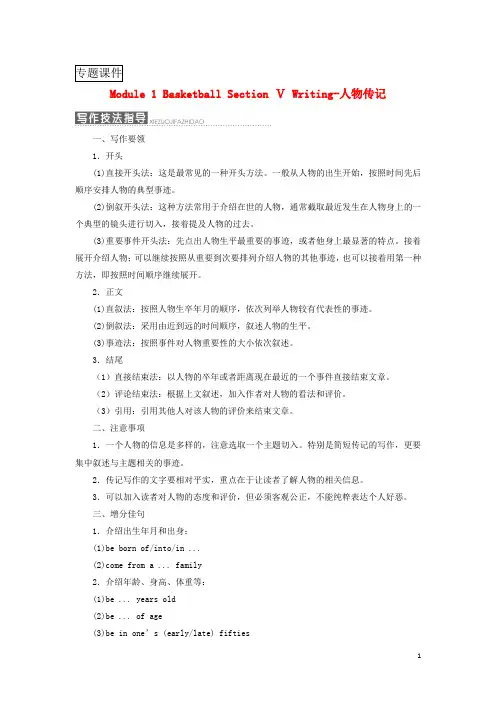
Module 1 Basketball Section Ⅴ Writing-人物传记一、写作要领1.开头(1)直接开头法:这是最常见的一种开头方法。
一般从人物的出生开始,按照时间先后顺序安排人物的典型事迹。
(2)倒叙开头法:这种方法常用于介绍在世的人物,通常截取最近发生在人物身上的一个典型的镜头进行切入,接着提及人物的过去。
(3)重要事件开头法:先点出人物生平最重要的事迹,或者他身上最显著的特点。
接着展开介绍人物;可以继续按照从重要到次要排列介绍人物的其他事迹,也可以接着用第一种方法,即按照时间顺序继续展开。
2.正文(1)直叙法:按照人物生卒年月的顺序,依次列举人物较有代表性的事迹。
(2)倒叙法:采用由近到远的时间顺序,叙述人物的生平。
(3)事迹法:按照事件对人物重要性的大小依次叙述。
3.结尾(1)直接结束法:以人物的卒年或者距离现在最近的一个事件直接结束文章。
(2)评论结束法:根据上文叙述,加入作者对人物的看法和评价。
(3)引用:引用其他人对该人物的评价来结束文章。
二、注意事项1.一个人物的信息是多样的,注意选取一个主题切入。
特别是简短传记的写作,更要集中叙述与主题相关的事迹。
2.传记写作的文字要相对平实,重点在于让读者了解人物的相关信息。
3.可以加入读者对人物的态度和评价,但必须客观公正,不能纯粹表达个人好恶。
三、增分佳句1.介绍出生年月和出身:(1)be born of/into/in ...(2)come from a ... family2.介绍年龄、身高、体重等:(1)be ... years old(2)be ... of age(3)be in one’s (early/late) fifties(4)be ... tall/in height(5)be ... kg heavy/in weight3.描写人物性格:kindhearted, a strong determination, good/bad tempered(脾气好/坏的),talkative(健谈的), enthusiastic, warmhearted, coldhearted4.评价用语:be respected by, be honored as, be considered as, be famous/known as/for/to[题目要求]根据下面的提示写一篇关于NBA 球星勒布朗·詹姆斯(LeBron James)的文章,内容要包括以下要点,不要逐句翻译。
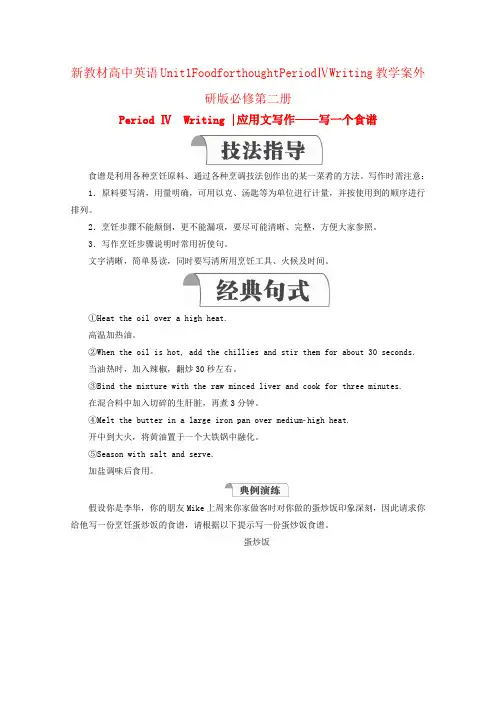
新教材高中英语Unit1FoodforthoughtPeriodⅣWriting教学案外研版必修第二册Period ⅣWriting |应用文写作——写一个食谱食谱是利用各种烹饪原料、通过各种烹调技法创作出的某一菜肴的方法。
写作时需注意:1.原料要写清,用量明确,可用以克、汤匙等为单位进行计量,并按使用到的顺序进行排列。
2.烹饪步骤不能颠倒,更不能漏项,要尽可能清晰、完整,方便大家参照。
3.写作烹饪步骤说明时常用祈使句。
文字清晰,简单易读,同时要写清所用烹饪工具、火候及时间。
①Heat the oil over a high heat.高温加热油。
②When the oil is hot, add the chillies and stir them for about 30 seconds.当油热时,加入辣椒,翻炒30秒左右。
③Bind the mixture with the raw mince d liver and cook for three minutes.在混合料中加入切碎的生肝脏,再煮3分钟。
④Melt the butter in a large iron pan over mediumhigh heat.开中到大火,将黄油置于一个大铁锅中融化。
⑤Season with salt and serve.加盐调味后食用。
假设你是李华,你的朋友Mike上周来你家做客时对你做的蛋炒饭印象深刻,因此请求你给他写一份烹饪蛋炒饭的食谱,请根据以下提示写一份蛋炒饭食谱。
蛋炒饭第一步:热锅中加入少许油,放入鸡蛋进行快速翻炒打散。
第二步:放入大蒜末和大米,翻炒至混合在一起。
第三步:加入豌豆、胡萝卜、葱,充分翻炒。
第四步:加入蚝油、酱油等调味料,并适量加入盐和白胡椒粉,继续翻炒3分钟。
第五步:盛盘上桌。
参考词汇:长粒大米 long grain rice; 蚝油 oyster sauce;酱油 soy sauce;葱 spring onion;白胡椒 white pepper[精彩范文]总评本文使用了正确的食谱格式,范文内容涵盖所有要点,结构严谨,简洁实用,可操作性强。
Module 1 Deep South Section Ⅰ Introduction &Reading-Pre-readingShip tourism to Antarctica is on the rise:More than 35,000 tourists are expected to visit Antarctica this summer. In 1992-1993, 6,750 tourists visited Antarctica,according to the Antarctica Treaty. All of this tourism, however, is putting both tourists and the environment ingreat danger.Among the tourist ships that visit the continent, the Explorer, a Canadian ship, was one of the first.Put to use in 1969, it was built to carry tourists to Antarctica. Last week, however, it became the first commercial (商业) passenger ship to sink beneath the waters. Fortunately, all of the passengers and crew members were rescued from the ship. However, the sunken ship endangered the Antarctic's fragile (脆弱的) environment. The ship was estimated to be holding 48,000 gallons of fuel.As a natural frontier, Antarctica is in a messy legal situation. There are no obvious answers as to who is responsible for dealing with the threat that touristmay cause to human life and the environment.There is no coast guard for Antarctica. Do we want it to become Disneyland, or do we need some controls?Section_ⅠIntroduction_&_Reading_—_Prereading[原文呈现]Antarctica①:the Last ContinentAntarctica is the coldest place on Earth. It's also the driest. With annual②rainfall③ close to④ zero⑤, Antarctica is technically a desert. Covering about 14 million square kilometres around the South Pole⑥, it is the fifth largest⑦continent in the world. A high mountain range, the TransAntarctic range⑧, runs from east to west, cutting the continent in two⑨. There are volcanoes too, but they are not very active. Antarctica holds⑩90% of the world's ice, and most of its fresh water (70%) is in a frozen state⑪, of course. 98% of the surface is⑫ covered permanently⑬ in the ice cap. On average⑭ it is two kilometres thick, but in some places it reaches a depth⑮ of five kilometres. Strong winds⑯driven by gravity⑰ blow from the pole to the coastline, while other winds blow round the coast. It is difficult to imagine a more inhospitable⑱ place.[读文清障]①Antarctica/æn'tɑːktIkə/n.南极洲②annual/'ænjuəl/adj.每年的n.年刊,年鉴③rainfall/'reInˌfɔːl/n.降水量;降雨量④close to靠近,接近,几乎⑤with复合结构作原因状语。
Unit 1单元核心考点归纳【重点词汇&短语】His speech made a strong impression on the audience.他的演说给听众留下了深刻的印象。
②He tried to impress me with his extensive knowledge of wine.他试图以自己在葡萄酒方面的渊博知识让我印象深刻。
③My father impressed on me the importance of hard work.父亲要我牢记努力工作的重要性。
④Walking around the city, we were impressed by its new look.在城市里四处走走,我们对其崭新的面貌有深刻的印象。
①Leather uppers allow the feet to breathe.皮质鞋面使脚得以透气。
②She was soon out of breath, but went on running.她很快就气喘吁吁了,但仍继续跑。
③He held his breath while the results were read out.宣读结果时,他屏住了呼吸。
Office workers fled in panic as the fire happened.起火时,办公室人员惊慌逃出。
②She got into a panic when she found her keys lost.当她发现钥匙丢了时她惊慌失措。
③The panic over your coming exams is meaningless.为即将到来的考试而恐慌是无意义的。
④The war panicked many people into escaping from their hometown.这场战争使得很多人惊慌失措地逃离家园。
The role will be the biggest challenge of his acting career.扮演这个角色将是他演艺生涯中最大的挑战。
外研版新教材必修第一册全册课时练习及单元检测unit1 a new start ...................................................................................................................... - 2 - Period 1Starting out & Understanding ideas ................................................................ - 2 - Period 2Understanding ideas ....................................................................................... - 9 - Period 3Using language—Grammar & Vocabulary .................................................... - 16 - Period 4Developing ideas ........................................................................................... - 23 - Period 5Writing应用文写作——日记 ...................................................................... - 29 - unit1 a new start单元检测卷 ....................................................................................... - 34 - unit2 exploring english ........................................................................................................... - 52 - Period 1Starting out & Understanding ideas .............................................................. - 52 - Period 2Understanding ideas ..................................................................................... - 60 - Period 3Using language—Grammar & Vocabulary .................................................... - 66 - Period 4Developing ideas ........................................................................................... - 74 - Period 5Writing .......................................................................................................... - 81 - unit2 exploring english单元检测卷.............................................................................. - 85 - unit3 family matters ............................................................................................................. - 103 - Period 1Starting out & Understanding ideas ............................................................ - 103 - Period 2Understanding ideas ................................................................................... - 110 - Period 3Using language—Grammar & Vocabulary .................................................. - 117 - Period 4Developing ideas ......................................................................................... - 126 - Period 5Writing ........................................................................................................ - 133 - unit3 family matters单元检测卷................................................................................ - 137 - unit4 friends forever ............................................................................................................ - 154 - Period 1Starting out & Understanding ideas ............................................................ - 154 - Period 2Understanding ideas ................................................................................... - 161 - Period 3Using language—Grammar & Vocabulary .................................................. - 169 - Period 4Developing ideas ......................................................................................... - 177 - Period 5Writing ........................................................................................................ - 184 - unit4 friends forever单元检测卷 ............................................................................... - 188 - unit5 into the wild ................................................................................................................ - 207 - Period 1Starting out & Understanding ideas ............................................................ - 207 - Period 2Understanding ideas ................................................................................... - 214 - Period 3Using language—Grammar & Vocabulary .................................................. - 221 - Period 4Developing ideas ......................................................................................... - 229 - Period 5Writing ........................................................................................................ - 236 - unit5 into the wild单元检测卷................................................................................... - 240 - unit6 a tone with nature ...................................................................................................... - 259 - Period 1Starting out & Understanding ideas ............................................................ - 259 - Period 2Understanding ideas ................................................................................... - 266 - Period 3Using language—Grammar & Vocabulary .................................................. - 273 - Period 4Developing ideas ......................................................................................... - 282 - Period 5Writing概要写作——人与自然 ................................................................ - 288 - unit6 at one with nature单元检测卷 ......................................................................... - 292 -unit1 a new startPeriod 1Starting out & Understanding ideas[基础训练]Ⅰ单词拼写1.The exhibit hopes to leave the best ________ (印象) on students.答案:impression2.This region is steeped in ________ (传统).答案:tradition3.The hotel has special ________ (设施) for welcoming disabled people.答案:facilities4.Children are greatly encouraged to ________ (探索) the unknown world.答案:explore5.Some schools are trying to make their ________ (校园) environment better.答案:campusⅡ单句语法填空1.The students are ________ a lot of pressure at school.答案:under under pressure为固定短语,意为“处于压力下”。
The Seventh PeriodThe General Idea of This PeriodIn this period, we will just review what we have learned in this module, at the same time, we will learn something about the school systems.Teaching Aims1. Review the useful words, expressions and sentences learned in this module.2. Master some everyday English.3. Learn some information about the school systems.Teaching Important Points1. Try to talk with others in English.2. Improve the students’ reading ability by rea ding the material.3. Learn something about the school systems.Teaching Difficult Points1. How to communicate with others in English.2. Master some information about the school systems.Teaching Methods1. Speaking, listening, reading and practicing.2. Pair work or group work.Teaching Aids1. the blackboard2. the multimediaTeaching ProceduresStep 1 Greeting and Lead-inT: Good morning, everyone!S: Good morning, Mr/Ms....T: Maybe today you are very relaxed because we will finish the first module. This is the last period of Module 1.But what have you learned in this module? Now let’s have a dictation.Step 2 TestWords:amazed amazing attitude behavior biology bored brilliant comprehension embarrassed embarrassing correction encouragement enthusiastic fluency photography handwriting instruction method progress spellingExpressions:(Give students Chinese meanings.)Write down:a girl called (named) Jenny have a word withbe interested in in a/one wordbe enthusiastic about/over/for devote...to...reading comprehension look up tohave fun look down upby oneself look intoin other words at the start/beginning ofschool system after-school activitiesgo to college summer vacationSentences:1. The teachers are very enthusiastic and friendly and the classrooms are amazing.2. Every room has a computer with a special screen, almost as big as a cinema screen.3. We are using a new textbook and Ms Shen’s method of teaching is nothing like that of the teachers at my JuniorHigh school.4. I am looking forward to doing it.5. The room is 3 times the size of that one.6. I was very interested in her teaching method.7. Group work activitie s won’t make you embarrassed because you can keep quiet if you want to.8. Would you mind answering the questions for me?(After the dictation, the teacher shows the information on the screen.)T: Now correct mistakes according to the information on the screen. Then hand in your papers.Exercises:Fill in the blanks with proper words.1. A. Nobody was________ in the story he told.B. The story he told was very________.(interested, interesting)2. A. Everybody was ________to hear the news.B. The news is very________ indeed. (excited, exciting)3. A. The result of the test was rather________.B. He was very________ at the result of the test.(disappointed, disappointing)4. A. What he said was very________.B. I was very________ at the sight.(amused, amusing)5. A. She felt a bit ________at the words.B. The situation was a bit________.(discouraged, discouraging)Keys:1. interested, interesting2.excited, exciting3.disappointing, disappointed4. amusing, amused5.discouraged, discouragingStep 3 Everyday English and FunctionT: Read this part of conversation between Rob and Diane. Look for the expressions they use to keep the conversation going and underline them.Suggested answers:Oh, really?Is that right?That’s great.Oh, I’m sure things will improve.Oh, that’s too ba d.T: Work in pairs. Have a conversation about one of your classes. You can use the expressions above to keep your conversation going.(Give the students enough time to prepare and then ask them to perform.)Possible answers:Dan: Hi, how are you doing?You: I’m fine.Dan: I’ve just been to a history class.You: Oh, really? How was it?Dan: It was OK. The teacher is really nice.You: That’s great.Dan: But some of the other students arehow.You: Oh, that’s too ba d.Dan: So the lesson was a bit boring.You: Oh, I’m sure things will improve.Dan: But I think I’m going to enjoy it.You: That’s great.Dan: What about you?You: I have just been to my first English class.(Show this conversation to the students to imitate.)Step 4 ReadingT: We know something about Chinese schools from Li Kang’s diary. Now read a letter from a senior high school student in the US. We may learn more about American school systems. After reading the letter just fill in the form. Things to prepare US school system Chinese school systemYears (before going tocollege)Twelve years Twelve yearsDifferent stages 1. The primary school (Gradesone to five).2. The secondary school (Gradessix to eight).3. The high school (Grades nineto twelve). 1. Primary school (Grades one to six).2. Junior middle school(Grades one to three).3. Senior high school (Grades 1-3).The first semester(time)From September to December. Through January.The second semester (time) From January to May. February through July. School schedule From 7:50 A. m. to 3 p.m. From 7:30 A. m. to 5 p.m. Foreign language to choose Spanish EnglishAfter-school activities football, basketball, volleyball,table tennis, theater club (sometimes) basketball, footballThe chance to go to university High school diploma. Pass College EntranceExamination.T: By comparing, we know that in US students have more spare time than Chinese students. Thus they can develop their interest in other things, also they will be good students in many ways of course, as Chinese students, we also should use this limited time to develop our potential and become excellent students.T: Do you want to know something about England school system? I will show you a passage on the screen.The Education System in England and WalesIn England and Wales,1must go to school by2from age 5 to 16,unless their parents should 3that they can4an adequate 5for them at home. There is a 6between the State System and the Private System is free of 7to all children, while Private School education is very8.The majority of children go to State Schools. The school system is 9down into three sections:A. Infants School (ages 4-7)B. Junior School (ages 7-11)C. Secondary School (ages 11-16/18)Infants and Junior School together are known as 10School. There are two types of State Secondary School:11Schools and 12Schools. Many Grammar Schools have long 13going back 500 years to the time when they were founded. To go to a Grammar School, students have to pass an exam, and the 14,is generally more 15,and most students stay at school until they are 18 and go on to University or College.Answers:children w 3.prove 4.provide cation 6.choice7.chargeprehensive12.Grammar13.traditions14.curriculum 15.academicT: I will read the whole passage. You should look at the screen and fill in the blanks according to your listening.Step 5 Summary and HomeworkT: In this lesson, we’ve gone through all the important things learned in this unit.We also have learned someinformation about foreign school systems. After class, you should write a brochure about your school according to the information on Page 10.Step 6 The Design of the Writing on the BlackboardModule 1My First Day at Senior HighThe Seventh PeriodImportant words:attitude embarrassed enthusiastic instructionImportant phrases:in other wordsat the start oflook forward toStep 7 Activity and InquirySteps Students’ Acting Teachers’ Organizing1 Have a dictation about words,phrases and sentences. Make the Ss pay attention to the rudimentary the knowledge.2 Try to communicate in English. Give the Ss chances to speak English.3 Listen to a passage and try to fill in the blanks. Read the passage.Detailed Explanation to the ExercisesGrammar1﹠2 1 study (2) 5 are doing (4)2 are studying (5)6 are learning (5)3 use (2)7 stars (1)4 play (2)8 rises (3)(1)表示现在(经常性)的情况或状态。